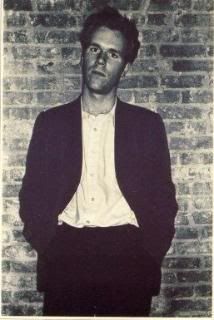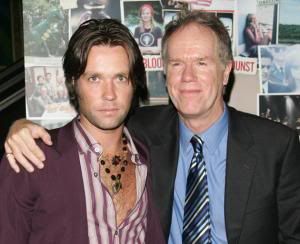Loudon Wainwright III: American Iconoclast

Loudon Wainwright III grew up in Westchester County an area just north of New York City an area that has long been associated the old money families who form the inner circle of America's social elites. Despite the decline of old money in America, Westchester still ranks as the 7th wealthiest county in the United States with a median family income of $98,000 more than twice the national average of $44,000.
The Wainwrights are a prominent American family and are direct descendants of Peter Stuyvesant, the Dutch religious leader and colonial governor who founded the city of New Amsterdam in 1653 which came to be called New York City when it was conquered by the British in 1664. The earliest historical chronicles of Manhattan Island has Stuyvesant's fingerprints all over it. As colonial governor of New Amsterdam, for instance, Styvesant commissioned the building of the flood wall that Wall Street is named after. Loudon's father (Loudon Wainwright Jr.) was a renowed news journalist and long time editor at Time magazine.
An element Loudon Wainwright's mystique was his decision to rebel against his own socially prominent birthright by becoming a musician. Loudon was the "refugee from a wealthy family" and the "holy man on the FM radio" that Joni Mitchell wrote and sang about in her memorable 1970 song Rainy Night House. Those families in the social registry firmly beleive that acting or singing popular music is a debasing and tawdry manner of earning an income that doesn't suit the higher aspirations of the ruling class. So Loudon was indeed a refugee from a wealthy family.
 Loudon Wainwright's cover shot for his first album which got a lot of airplay in the small network of "uderground" FM radio stations in 1970
Loudon Wainwright's cover shot for his first album which got a lot of airplay in the small network of "uderground" FM radio stations in 1970
First impressions are lasting and I’ll never forget my first encounter with his debut album. I was transfixed by photo of Wainwright on the cover of the album. The iconic photo for Loudon Wainwright's first album (called
Album) has a picture of a young man directing a disarming gaze at the camera. Wainwright's studied pose suggested a world weary misanthrope who saw too much, too soon in life. . It’s a mesmerizing but disturbing portrait of an artist as a young man that is a timeless statement. It's the same camera ready glare adopted many angry punk rockers directed at photographers, six or seven years later.
40 years and 22 albums later Wainwright's personae is a bit less threatening but his songs can still draw out wide range of disturbing emotional responses. At age 62 Wainwright's music maintains the razor edged psychosocial and political commentary. While a middle aged Dylan took a 30 year detour into a ghost town of musical mediocrity, Loudon Wainwright kept thrilling his fans with a magical mystery tour of sublimely dark albums that evoked the existential pain of the human condition with brilliant clarity.
Part of the reason Loudon did not go gentle into that good night was his own ignoble firing by two major labels early in his career. Atlantic and Columbia Records both dropped Wainwright early in his career for being a difficult artist who refused to knuckle under to the demands of producers. Atlantic and Columbia Records wanted Wainwright to stop writing dark moody music and write more humorous songs like Dead Skunk, Wainwright's only commercial success, Dead Skunk was a novelty song he detested and regretted ever having recorded.
By age 27 Loudon Wainwright was without a label deal. In the early Seventies, an artist who provoked a major label into firing him, was an artist with a career death wish. Loudon managed to provoke two different labels into firing him. By the mid-Seventies many astute observers thought Wainwright’s 15 minutes were over and he was on the fast track to obscurity. Loudon Wainwright had become an independent musical contractor who was forced to sell his music on it's own merits to small indie labels who have made concessions to his unique musical vision. Along the way Wainwright married and divorced the recently deceased French Canadian folk singer Kate McGarrigle and he sired two son (Rufus) and a daughter (Martha) who were both precousious musical prodigies as children and successful recording and perfoming artists as adults. Later he married Suzzy Roche of the family musical group the Roches and their child will probably become another musically precocious brat in the Wainwright tradition.
 Wainwright & Son- Loudon shares a father/son moment with Rufus
Wainwright & Son- Loudon shares a father/son moment with Rufus
Most critics and the general public have ignored Loudon's music over the past 20 years, It's unfortunate because Loudon saved his best stuff for last. Since his early 40s Wainwright has been composing frightfully good songs that soar far above the music he wrote when Joni Mitchell celebrated him as the holy man on the FM radio. The choices are many but in the interest of space I selected three of my favorites:
Handful of Dust from the album History (1992)
Primerose Hill from the Album Little Ship (1998)
Graveyard from the album Last Man On Earth (2001)